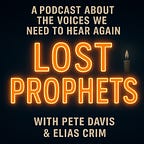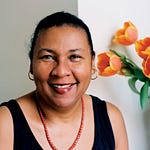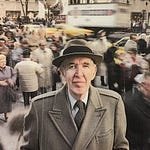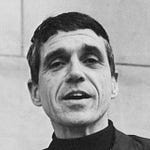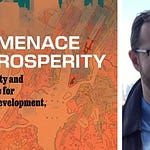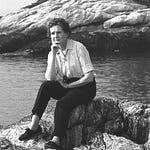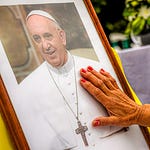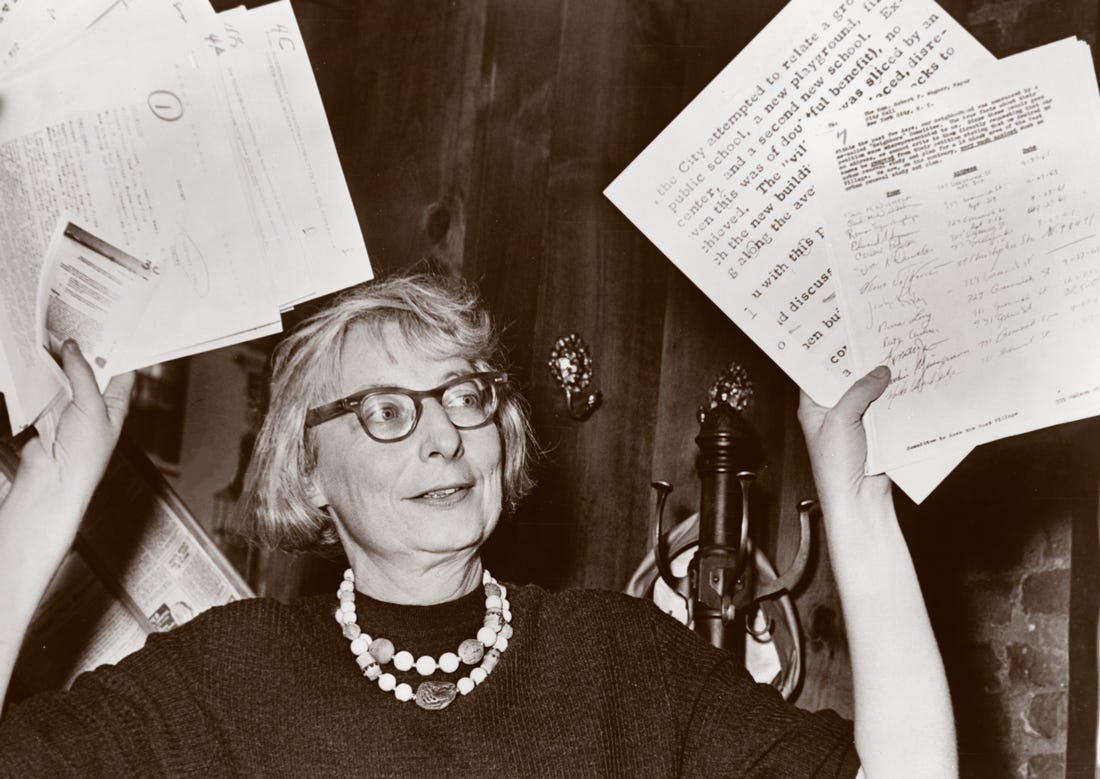
In her later years, Jane Jacobs once recounted her reaction upon coming to New York in the early 1940s: “It was inexhaustible. Just to walk around the streets and wonder at it. So many streets different. So many neighborhoods different. So much going on.”
In this language, we hear not only her love of cities but the beginnings of her intuition that we grasp truth through love. Thinking of the city planners of her day, many of whom seemed dubious about cities, she argued that it’s a big mistake to try to reform something you hate because that emotion will contaminate your prescription.
One version of Jane Jacobs (in the eyes of her opponents) is the “uncredentialed housewife” whose organizing talents in 1962 defeated New York City’s mega-planner Robert Moses and his Lower Manhattan Expressway, thereby rescuing for later generations the neighborhoods of SoHo (one of the greatest inventories of 19th century buildings in the world) and Little Italy.
Another version of Jane is the “city naturalist,” a keen observer of processes hiding in plain sight: the organic order of streets, the mail shunting by beneath her feet in pneumatic tubes, the diamond trade, the flower market. A true urbanophile, she saw self-organizing networks everywhere.
A third Jane is the ecologist of cities and the champion of economic diversity, perhaps the most powerful benefit cities can offer.
What Rachel Carson did for the natural environment or Ralph Nader for the commercial environment, Jane Jacobs did for the built environment. She became the articulate voice and defender of a movement which now seems merely common sense: a bottom-up approach to urbanism which values streets over buildings, people over automobiles, and the unpredictable over the centrally planned.
For our conversation about Jane Jacobs, we spoke with her longtime friend and ally in urbanist advocacy Roberta Brandes Gratz, author of The Battle for Gotham: New York in the Shadow of Robert Moses and Jane Jacobs, among other titles.
Takeaways from our conversation:
“Cities are created by everybody.” Jane saw them as places where ordinary people had the chance to do something new and interesting. They offer scope for all kinds of people.
Jane’s new theory about how cities function and her insight into the kind of problem a city is—i.e., one of organized complexity, requiring us to deal simultaneously with numerous interrelated factors in an organic whole.
Against those who saw only disorder, Jane could see an intricate and unique order, which she liked to describe using ecological metaphors.
Jane’s landmark book, The Death and Life of Great American Cities, gave a boost to localism of all sorts, including the local food movement.
The concept of import replacement: Jane thought it her most important contribution. Not a product of planning but of bottom-up processes of discovery within a city.
Jane was part of the wave of resistance to centralized authority in the 1960s—Betty Friedan, Rachel Carson, Noam Chomsky, the civil rights movement.
Big plans live intellectually off little plans. Without the latter, planners often make big mistakes which cannot easily be corrected.
Jane’s idea that we’re living in a time of “dying priesthoods” of all kinds. “We need unlimited independent thinkers with unlimited skepticism and curiosity.”
Jane’s enormous impact on reverting cities from car-dominated places back to walkable (and bikeable) places.
Episode Sections:
Introduction to Jane Jacobs [00:00:00]
Her early life and upbringing [00:02:47]
Her deep curiosity and early interests [00:07:29]
Early career as a journalist [00:13:35]
Development of her urban theories [00:19:00]
Her activism against urban renewal projects [00:39:32]
Discussion of Jane's major books:
The Death and Life of Great American Cities [00:30:00]
The Economy of Cities [00:52:01]
Cities and the Wealth of Nations [00:57:56]
Systems of Survival [01:05:00]
Interview with Roberta Gratz [01:09:56]
Discussion of Jane's final book Dark Age Ahead [02:03:00]
Concluding thoughts on her legacy [02:11:56]
Recommended:
Eyes on the Street, Robert Kanigal (2017)
Citizen Jane: Battle for the City Documentary (2016)
Jane Jacobs: City Limits Documentary (1971)
Death and Life of Great American Cities, Jane Jacobs (1961, 1992)
The Economy of Cities, Jane Jacobs (1970)
Cities and the Wealth of Nations, Jane Jacobs (1985)
Dark Age Ahead, Jane Jacobs (2007)
The Battle for Gotham: New York in the Shadow of Robert Moses and Jane Jacobs, Roberta Brandes Gratz
Strong Towns, an nonprofit advocacy group whose work is influenced by Jacobs’ ideas.
Many thanks to the great band NOBLE DUST, who provides the music for Lost Prophets. Their latest album A Picture for a Frame is here.
This is the second episode of LOST PROPHETS, a podcast about the mid-century voices of solidarity we need to hear again. To listen on your podcast player, our Spotify link is here, Apple Podcasts link is here, and RSS link is here.


